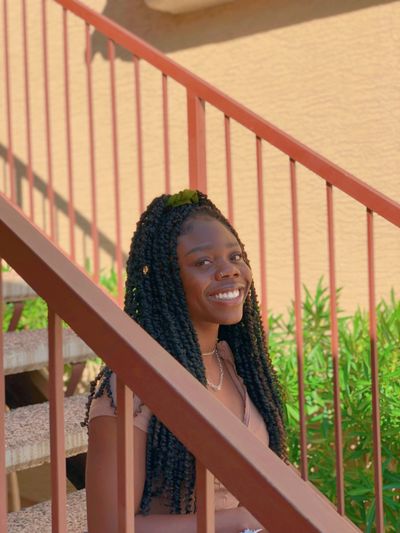Black Box

Every Spokane teen has their own story of growing up, facing challenges and working to match or beat expectations. Now add the complicating factors of being a Black high school student in a city that is often welcoming, but overwhelmingly white. In today’s Serendipity section, The Spokesman-Review shares essays and a poem by six such young people. Each of their stories brings a different perspective. And yet each of them expresses a yearning for acceptance and respect.
They told me it did not matter the pigmentation of my skin
Or the way my hair coiled up tight unlike the straight locs
Even the amount of products I used could not falter the coils
Even the braids wound tight on my scalp failed to hide texture
They said that being different was a good thing
That even though I was different, I would still fit in
The desire to fit in was like a nail being bent out of shape
The more the hammer struck,
The nail bent more
leaving it more different than the rest
No matter how many times I tried to be someone else
I was still different.
Fitting in brought a sense of belonging that I so badly wanted
Like if I was just to blend in, I would be forgotten and left alone in the mix
I was raised by white parents who saw past my skin color
But forget the struggle of what comes with the skin color they so loved
Why I couldn’t wear a hoodie when in stores
Why I had to be timid and cautious of my surroundings
Why I could not see past my own melanin while looking in the mirror.
I did not understand why my peers saw me as different though we were both human,
Why, when adults spoke to me, questions showed in their eyes
“What is her story?” “What was it like being adopted?” “Does she speak English?”
Loud, slowed voices left me wondering if they knew I understood them.
The kids, loud and unfiltered, questioned why my lips were so big
Or why my skin was darker in some places and lighter in others.
I could never explain to them why
Because when I looked in the mirror
The person before me only seemed to reflect what they saw.
They saw “the angry black woman” “aggressive” “the thug.”
They placed me in a box with my lighter skinned brothers and sisters which they favored.
I dared to step out of that box, afraid of the outbreaks I’d cause
I tip-toed around the truth, afraid to shatter the glass frame I placed around myself.
I am afraid to step out of the box, but I forget that “black” is just a word
not what I am.